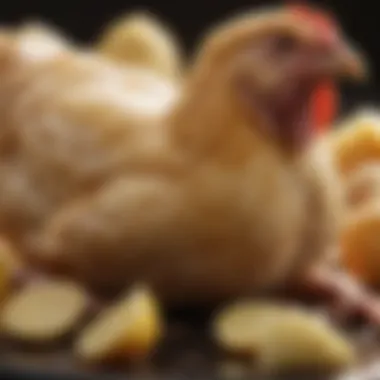Essential Dietary Strategies for Dogs with Diarrhea


Intro
Dealing with your dog’s diarrhea can be distressing. It is not just a minor issue. Diarrhea may indicate underlying health problems or dietary indiscretion. Understanding how to appropriately respond can aid in recovery and improve your dog’s well-being. While considerations such as breed and temperament play a role in shaping your dog’s dietary needs, this article focuses on feeding strategies designed specifically for this condition. The right foods and supplements can be vital in managing diarrhea.
Understanding Your Pet
When faced with a situation like diarrhea, it’s important to first gain a deeper understanding of your pet's unique traits. Each breed has different characteristics that can influence its nutritional requirements.
Breed Traits
Certain breeds may have digestive sensitivities, while others might be more resilient. For instance, smaller breeds tend to have faster metabolisms. This means they often require more frequent feeding with easier-to-digest food. Large breeds may be at higher risk for certain gastrointestinal issues. Recognizing these traits assists in determining the most suitable food options when diarrhea occurs.
Common Temperaments
Temperament affects how a dog copes with sickness. A calm dog might not show stress, while an anxious dog may refuse food or water. Monitoring their behavior helps you decide how to introduce new foods gradually. A dog under stress may need softer foods to ease their digestion.
Special Needs
Dogs with existing health conditions, such as pancreatitis or food allergies, require more tailored diets. For these dogs, it’s crucial to consult veterinary guidelines before altering their food. Ensuring that any new diet accommodates their needs will support their recovery without exacerbating existing health issues.
Pet Care Essentials
In times of gastrointestinal upset, adherence to certain care essentials can make a significant difference.
Nutrition and Feeding Guidelines
Feed your dog easily digestible foods. Options like boiled chicken, plain white rice, or pumpkin can help firm up stools. These choices provide necessary nutrients without overwhelming your dog’s system. Additionally, consider small, frequent meals rather than large portions. This helps avoid adding further stress to their digestive tract.
Standard Foods to Avoid
- Dairy products can lead to further upset.
- Fatty foods may worsen diarrhea.
- Spices or other irritants should be strictly avoided.
Grooming Tips and Techniques
While your dog is unwell, grooming may need to be adjusted. Bathing immediately after any mishaps can help prevent irritation and maintain hygiene. This requires a gentle approach, especially if your dog is feeling under the weather.
Health and Wellness
It’s important to keep a close eye on hydration. Dehydration is a risk when dogs experience diarrhea, so make sure they have access to clean water at all times. In some cases, electrolyte solutions designed for dogs may be advisable. Monitoring their overall behavior can reveal if they require veterinary intervention.
End
Recognizing the wider implications of diarrhea on your dog’s health is fundamental. Tailoring their diet, understanding their unique needs, and applying proper care can promote recovery. Each dog is different, so it's key to adapt to their requirements based on individual traits and needs. By following the guidelines mentioned, you can enhance your dog's comfort and support their well-being during this challenging time.
Understanding Diarrhea in Dogs
Understanding diarrhea in dogs is crucial for any pet owner. This common ailment can arise from various causes, ranging from mild dietary indiscretions to more serious health concerns. Knowing the nuances of diarrhea can help you manage the situation effectively, ensuring your pet receives the right care. When discussing diarrhea, onne's focus should be on recognizing signs, understanding underlying causes, and knowing when to seek professional help.
Causes of Diarrhea
Diarrhea in dogs can stem from a variety of sources. Understanding these causes allows for appropriate management and feeding strategies. Some of the most common causes include:
- Dietary changes: Introducing new food too quickly or offering inappropriate treats can upset a dog's digestive system.
- Infections: Bacterial, viral, or parasitic infections can disrupt normal digestion lasting several days.
- Food intolerances or allergies: Dogs may react negatively to certain ingredients, leading to gastrointestinal disturbances.
- Toxins: Ingesting toxic substances, such as certain plants or human foods, can result in diarrhea.
- Underlying health conditions: More serious issues like pancreatitis or inflammatory bowel disease may be at play.
Recognizing these causes can help in tailoring feeding practices to better support recovery.
Symptoms to Watch For


Identifying symptoms accompanying diarrhea is vital. While some signs are straightforward, others may require more discernment. Key symptoms include:
- Frequent bowel movements: Increased urgency and frequency are prevalent in dogs experiencing diarrhea.
- Changes in stool consistency: Watery or loose stools are the hallmark of this condition.
- Gas and bloating: Excessive gas may be observed alongside diarrhea, causing discomfort in the dog.
- Vomiting: This can sometimes accompany diarrhea, indicating a more severe gastrointestinal upset.
- Lethargy: A decrease in activity levels may signify a more serious problem.
By monitoring these symptoms, you can make informed choices regarding your dog's diet and care.
When to Consult a Veterinarian
It is important to know when to seek professional veterinary guidance. Diarrhea can sometimes resolve itself, but in certain situations, it may indicate a more serious issue that requires intervention. Consider consulting a veterinarian if:
- The diarrhea lasts more than 24 hours.
- Your dog shows signs of dehydration, such as dry gums or severe lethargy.
- There is blood in the stool or vomit.
- Your dog is very young, elderly, or has pre-existing health conditions.
- Accompanying symptoms worsen or do not improve.
In these cases, professional care can provide the necessary treatment and prevent further complications. Being vigilant and responsive is essential for maintaining your dog's health during episodes of diarrhea.
Initial Care for Dogs with Diarrhea
Understanding how to care for a dog experiencing diarrhea is crucial for any pet owner. Diarrhea can lead to dehydration and other complications if not managed correctly. Implementing initial care measures can help stabilize their condition and promote faster recovery. Therefore, focusing on simple yet effective strategies can significantly impact your dog's health during this trying time.
Fast Your Dog Temporarily
One of the first steps in attending to a dog with diarrhea is to fast them temporarily. This means withholding food for a period, which can range from 12 to 24 hours depending on the dog's age and health status. Fasting allows the digestive system to rest and can help to clear irritants from the gastrointestinal tract. Once the fasting period is over, you can gradually introduce bland foods. It is essential, however, to monitor your dog's overall condition during this phase. If they show signs of extreme lethargy or other concerning symptoms, seeking veterinary advice is vital.
Ensure Hydration
Ensuring your dog stays hydrated is critical when they have diarrhea. Diarrhea often leads to significant fluid loss, which can quickly result in dehydration. Make sure to provide access to fresh water at all times. However, if your dog refuses to drink or seems to be drinking less than usual, you can take several measures to encourage hydration:
- Offer small amounts of water frequently instead of letting them drink a large amount at once.
- Consider providing an electrolyte solution designed for pets to help replenish lost minerals.
- If your dog is willing, you can also give them low-sodium chicken broth or plain homemade broth. This can entice them to drink and provide some necessary nutrients.
It's important to keep an eye on the signs of dehydration, such as dry gums, lack of skin elasticity, or excessive panting. If any of these symptoms appear, contact your veterinarian promptly.
Suitable Foods for Dogs Recovering from Diarrhea
When a dog experiences diarrhea, choosing the right foods becomes crucial for healing. The right diet can help soothe the digestive system and restore normal bowel function. It is essential to focus on digestible options that provide necessary nutrients while being gentle on the stomach. This part will discuss bland diet recommendations and commercial diets specifically designed for dogs recovering from diarrhea.
Bland Diet Recommendations
Boiled Chicken and Rice
Boiled chicken and rice is a commonly recommended food for dogs dealing with diarrhea. This meal combination is easily digestible and does not have complex ingredients. The key characteristic of this dish is its simplicity, making it a popular choice among veterinarians and pet owners.
The unique feature of boiled chicken is its lean protein content, which helps provide energy during recovery. Coupled with rice, this dish offers carbohydrates that are easy for the dog to process. Additionally, it minimizes the risk of upset stomach that could occur with more complex diets. However, it is essential to avoid seasoning or additives. Exceeding the amount may lead to further digestive issues.
Plain Pumpkin
Plain pumpkin is another great option for dogs with diarrhea. Its key characteristic is its high fiber content, which can help regulate a dog's digestive system. Many pet owners find pumpkin to be a beneficial choice during recovery, as it promotes healthy stool formation.
One unique feature of plain pumpkin is its ability to absorb excess water in the intestines, which reduces the water content of fecal matter. This can be especially useful in cases of diarrhea. However, it is important to ensure that the pumpkin is plain and without added sugars or spices. Some dogs may not respond well to pumpkin, so monitoring their reaction is advisable.
Plain Sweet Potatoes
Plain sweet potatoes are another nutritious option for dogs recovering from diarrhea. Their key characteristic lies in their rich source of vitamins, dietary fiber, and carbohydrates. Sweet potatoes are also known for their anti-inflammatory properties, which can aid in calming an upset stomach.
The unique feature of plain sweet potatoes is their versatility. They can be mashed or offered in small cubes, making them adaptable according to the dog’s preference. One must ensure they are cooked and unseasoned. Some dogs might find them difficult to digest if given in large amounts initially. Gradual introduction is key.
Commercial Diets for Diarrhea
Veterinary Prescribed Diets


Veterinary prescribed diets are specifically designed for dogs experiencing diarrhea or other gastrointestinal issues. These diets are formulated to be highly digestible and contain precise nutrient profiles needed for recovery. The key characteristic of these foods is the tailored blend of ingredients that supports immediate health needs.
Focusing on digestibility and inflammation management offers several advantages. For instance, they often include probiotics that can help restore balance in gut flora. However, these diets can be more expensive than homemade options. Discussing choices with a veterinarian is advisable to find the best fit.
Pet Store Solutions
Pet store solutions refer to commercial diets that can be purchased without a prescription but are still formulated for digestive issues. They are often marketed as
Supplements and Probiotics
When your dog experiences diarrhea, the digestive system undergoes significant stress. Incorporating supplements and probiotics into the recovery process can be beneficial. They play an essential role in restoring gut health and promoting overall well-being.
Probiotics contain live beneficial bacteria. These bacteria assist in re-establishing a balanced intestinal microbiome. They can help combat harmful bacteria and improve digestion. Additionally, these microorganisms can support the immune system, which is crucial during recovery from gastrointestinal disturbances. Therefore, considering probiotics when your dog is dealing with diarrhea makes sense.
Why Consider Probiotics?
Probiotics are not just a fad; they have a scientific basis for their effectiveness. They can help to restore the natural flora of your dog’s gut after diarrhea. Dogs may lose important bacteria due to stress, illness, or dietary changes. Probiotics provide a convenient way to reintroduce these beneficial microorganisms.
The use of probiotics has shown promising results. Studies suggest that they can lead to a faster recovery time and less severe symptoms. When selecting a probiotic, choose one that is specifically formulated for dogs. Look for products that contain multiple strains of bacteria for a broader benefit.
Other Supplements to Aid Recovery
Digestive Enzymes
Digestive enzymes assist in breaking down food more effectively. They are particularly useful during recovery phases when a dog’s digestive system may not function optimally. The primary role of these enzymes is to facilitate the digestion of proteins, fats, and carbohydrates. This support can expedite the recovery process and reduce the risk of further gastrointestinal issues.
A key characteristic of digestive enzymes is their ability to enhance nutrient absorption. When your dog’s body is recovering, ensuring it receives all necessary nutrients becomes critical. However, not all dogs will require digestive enzymes. Some may regain their typical digestive function naturally. If you choose to use them, consult your veterinarian for guidance on dosages.
Electrolyte Solutions
Electrolyte solutions serve an important function during episodes of diarrhea. Diarrhea can lead to fluid loss, which in turn causes dehydration. Electrolytes, such as sodium and potassium, are lost alongside fluids. To mitigate this, providing your dog with electrolyte solutions can help maintain proper hydration and balance essential nutrients.
These solutions often come in liquid form, making them easy to administer. A key feature of electrolyte solutions is their ability to restore lost minerals quickly. They are particularly beneficial when your dog shows signs of severe dehydration. That said, it is crucial to select products designed specifically for dogs, as human solutions can contain ingredients that are harmful to them. Always monitor your dog's condition closely and adjust the use of supplements based on their response.
Remember: While supplements can provide support during recovery, they should not replace a balanced diet or veterinary care when necessary.
By understanding and utilizing these supplementary options, owners can take proactive steps to support their dog's health during recovery periods. Making informed choices about probiotics and supplements can help ensure that your dog returns to its normal, healthy self more efficiently.
Introducing Solid Foods Back into the Diet
When a dog experiences diarrhea, restoring their diet to normal solid foods is crucial. It signals a turning point in their recovery. The reintroduction of solid foods must be approached cautiously. This method helps ensure your dog's digestive system is ready to handle more complex meals. An abrupt change back to regular food can lead to further digestive distress.
A careful transition can benefit your pet's health. This gradual reintroduction allows their gut flora to rebalance and strengthens their digestive capability. Monitoring your dog during this phase is essential. This approach fosters a smoother recovery while giving you confidence in their ability to handle solid foods again.
Gradual Transition Process
Transitioning back to solid foods should not happen hastily. Start by mixing small amounts of their normal kibble with bland foods they have been eating during their recovery, such as boiled chicken or rice. Gradually increase the proportion of regular food over several days, typically about a week.
- Day 1-2: Mix 75% bland food with 25% regular food.
- Day 3-4: Adjust the ratio to 50% bland food and 50% regular food.
- Day 5-6: Shift to 25% bland food and 75% regular food.
- Day 7: Resume normal feeding if no symptoms return.
This method helps in gradual adjustment and minimizes chances of stomach upset. Each dog’s timeline may vary, so observe their reactions carefully.
Monitoring Your Dog's Response
During this transition, close monitoring is vital. Watch for signs of recurring diarrhea or discomfort. A good strategy is to keep a journal or log of what you feed your dog, noting any reactions. Signs to observe include:
- Changes in bowel movement consistency
- Signs of pain or discomfort
- Appetite levels


If any symptoms arise, consider reverting to bland foods and prolong the transition. If your dog reacts well throughout, it’s a positive sign they are ready for full solid foods.
By staying observant, you ensure your dog's recovery is both effective and thorough.
Long-Term Dietary Considerations
Dealing with a dog's diarrhea may require immediate action, but long-term dietary considerations are equally critical. These considerations help ensure that the dog stays healthy and minimizes the risk of future gastrointestinal issues. A proper diet forms the foundation of overall health. Tailoring foods to meet nutritional needs can also prevent imbalances that lead to problems such as diarrhea.
Proper nutrition supports a dog's immune system, fosters digestion, and improves coat condition. It's not just about what to feed your dog post-diarrhea. It's also vital to establish a consistent, balanced diet that accommodates your dog’s specific needs. This can help form the basis for sustained well-being.
Establishing a Balanced Diet
A balanced diet incorporates all essential nutrients: proteins, carbohydrates, fats, vitamins, and minerals. Each nutrient plays a specific role, and deficiencies may lead to health issues. Consider including:
- High-Quality Proteins: Sources include lean meats, fish, and eggs. These are crucial for tissue repair and muscle development.
- Complex Carbohydrates: Foods like sweet potatoes and brown rice are excellent for energy and gut health. They also aid in firming up stools during recovery.
- Healthy Fats: Omega fatty acids from fish oil or flaxseed oil can support skin health and promote good digestion.
Maintaining a consistent feeding schedule also matters. Dogs thrive on routine, so keeping mealtimes stable may help their digestive system function effectively. Gradually transition between different types of food if necessary, to allow the digestive system to adjust.
Identifying Potential Food Allergies
Food allergies can be a significant underlying issue behind chronic diarrhea. Allergies make it difficult for digesting certain ingredients, leading to recurrent gastrointestinal distress. Common allergens include:
- Beef
- Chicken
- Dairy products
- Wheat
To identify food allergies, it can be helpful to conduct an elimination diet. This involves:
- Removing all potential allergens from your dog’s diet for a period of time, usually around 8-12 weeks.
- Gradually reintroducing one protein at a time, allowing at least a week before adding another. This helps you observe any reactions. If diarrhea occurs again, it might indicate a sensitivity to the latest reintroduced food.
- Consulting a veterinarian for tests or advice tailored to your dog’s specific needs. A vet can help guide dietary choices and address any lingering issues.
Understanding long-term dietary considerations certainly contributes to better health for dogs. By focusing on nutrient balance and being vigilant about food sensitivities, pet owners can help their dogs thrive and reduce incidences of diarrhea.
Preventative Measures for Diarrhea
Preventing diarrhea in dogs is crucial for maintaining their overall health. Understanding preventative measures not only mitigates risks but also enhances the dog's quality of life. Consistent efforts can save pet owners from distress during sudden episodes of diarrhea.
Routine Check-Ups
Regular veterinary check-ups are essential for early detection of potential health issues. Routine exams help in monitoring your dog's health and provide veterinarian professionals the opportunity to identify any underlying causes of diarrhea before they escalate.
During these visits, your vet may conduct a thorough examination that includes fecal tests to rule out parasites or infections. This proactive approach ensures any abnormalities in your dog's digestive system are swiftly addressed. Additionally, these check-ups provide pet owners with essential guidance tailored to their dog's specific needs, such as diet adjustments or lifestyle changes. Keeping up with scheduled appointments fosters trust with the veterinarian and ensures comprehensive care of your pet.
Safe Feeding Practices
Implementing safe feeding practices is another significant line of defense against diarrhea. These practices focus on not only what food your dog eats but also how it is fed.
- Quality of Food: Ensure the food you choose meets high quality standards. Look for reputable brands that use natural ingredients without harmful additives.
- Gradual Changes in Diet: If you must change your dog’s diet, introduce new food gradually over several days. This way, your dog’s digestive system can adjust without undue stress.
- Supervise Feeding: Supervise your dog during feeding times to prevent them from eating too quickly or consuming something harmful.
- Avoid Human Food: Resist giving your dog human food, especially fatty or spicy items. This can upset their stomach and lead to possible diarrhea.
By adhering to these safe feeding practices, pet owners can significantly reduce the likelihood of diarrhea and promote better digestive health.
“Preventative care is always more effective than reactive treatment.”
Finale
Understanding the importance of appropriate feeding strategies during your dog's bout of diarrhea cannot be overstated. Dietary choices play a crucial role not only in promoting recovery but also in preventing future incidents. By adhering to the guidelines provided in this article, pet owners ensure a structured approach to managing their dog's health. The recommended foods and supplements support the restoration of your dog's digestive system. Moreover, the transition back to normal feeding must be done with care.
Recap of Key Points
- Identifying and understanding the possible causes of diarrhea in dogs.
- Implementing suitable initial care steps, such as temporary fasting and ensuring hydration.
- Offering a bland diet with options like boiled chicken and rice or plain pumpkin to aid recovery.
- Considering commercial diets specifically formulated for digestive health when necessary.
- Incorporating probiotics and other supplements to restore gut flora and aid recovery.
- Gradually reintroducing solid foods to minimize digestive upset.
- Maintaining a balanced long-term diet while watching for potential food allergies.
- Implementing preventative measures, including safe feeding practices and routine check-ups.
These points are essential as they equip pet owners with knowledge on monitoring their dog's health effectively. They foster a supportive environment for recovery, lowering stress for both the owner and the furry companion.
Importance of Monitoring Your Dog's Health
Monitoring your dog's health is critical during and after episodes of diarrhea. Regular observation helps track improvements or setbacks in their condition. Your dog's behavior, appetite, and stool quality should be closely assessed. This vigilance enables timely intervention should symptoms worsen or persist.
If diarrhea lasts beyond 24 hours or if additional symptoms arise, such as vomiting or lethargy, it is imperative to consult a veterinarian. Regular veterinary check-ups, as mentioned earlier, can also help prevent issues from developing into more significant health concerns. Ultimately, your attentiveness is integral to nurturing a healthy, happy dog.



